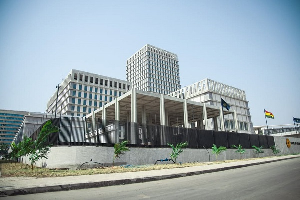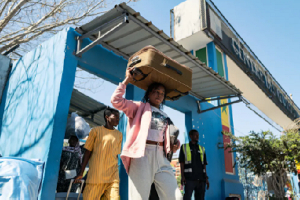ACCRA, Ghana, August 14, 2001 (ENS) - The Ghana Ports and Harbours Authority (GPHA) has defied protests and warnings from environmental groups and activists by dumping abandoned fishing vessels from the Tema fishing harbor on the high seas.
The operation was undertaken by a combined team from Acquatech Diving Company and GPHA marine personnel.
Efforts to dump the abandoned vessels have been met with resistance from vessel owners, with the backing of some port officials, and spearheaded by the Ghanaian based Federation of Environmental Journalists (FEJ) and its allies.
There are 12 abandoned fishing vessels at the harbor as the GPHA has not prevented vessel owners from leaving their boats at the port since 1989.
On Friday, the authority ignored the protests and circumvented international conventions on marine resources and waste disposals when GPHA personnel dumped MV Anami, one of the vessels which has been abandoned since 1998.
According to Jim Kwame Fugah, the fishing harbor manager, some of the abandoned vessels have occupied berthing space, creating congestion at the harbor, a reason the environmentalists have rejected.
Fugah said this has led to the sinking of MV Bami, a vessel, at the fishing harbor since April when she suddenly took in excess water and could not immediately be tugged out.
Fugah disclosed that the GPHA will spend over 15 million cedis (US$2,300,) to tow each of the abandoned vessels out to sea. He said the operation is aimed clearing the congested harbor. Other vessels, including MV Ayensu owned by Inflacto Fishing Company, would be dumped on high seas this week, said Fugah.
Early Monday morning, Ghanaian environmental journalists led by the federation renewed their protests with a press statement condemning the GPHA’s action, describing it as insensitive to the natural environment and a threat to marine life. Journalists in Ghana do not view expressing their opinions as unprofessional.
The journalists said the steel from the vessels could have been recycled for other purposeful use instead of dumping. Ghana spends huge sums importing steel for the mental manufacturing industry.
The journalists called on Ghana's Environmental Protection Agency (EPA) and the Fisheries Commission to resist further attempts by the GPHA to dump other vessels. Both government agencies are charged with the responsibility of ensuring sound environmental practices and the sustainability of natural resources including fisheries.
In their statement, the journalists said the EPA and other agencies responsible for the sustainability of Ghana's bodies of water and fisheries resources have not lived up to their responsibilities.
They called on the Ministry of Environment, Science and Technology not to allow profit seeking agencies like the GPHA to sidestep international conventions and national laws and regulations governing the environment.
S.B. Akuffo, a Ghanaian environmental consultant, described the vessel dumping as criminal and sheer irresponsibility. He accused the EPA of remaining silent on the issue and called for action to stop the GPHA from further dumping in the seas.
The Ghanaian Ministry of Environment, Science and Technology, the EPA, the Fisheries Commission and other governmental agencies have remained silent. Some of the vessel owners have threatened to resort to court to restrain the GPHA from going ahead with its dumping plans.
The city of Tema was built in 1960 as a manmade harbor. The city is located in southeast Ghana, on the West coast of Africa. Since 1999, traders and international shipping lines serving West Africa have been calling on the Ghanian government to take urgent action to tackle growing congestion in Tema and Takoradi ports.
Service standards at both ports are not up to handling the escalating volume of shipping traffic and are disrupting trade, industry sources complain.
General News of Saturday, 25 August 2001
Source: By Emmanuel Kojo Kwarteng
Ghana's Dumping of Abandoned Boats Draws Environmental Blame
Entertainment

Chez Amis CEO addresses NACOC arrest allegations
Opinions









